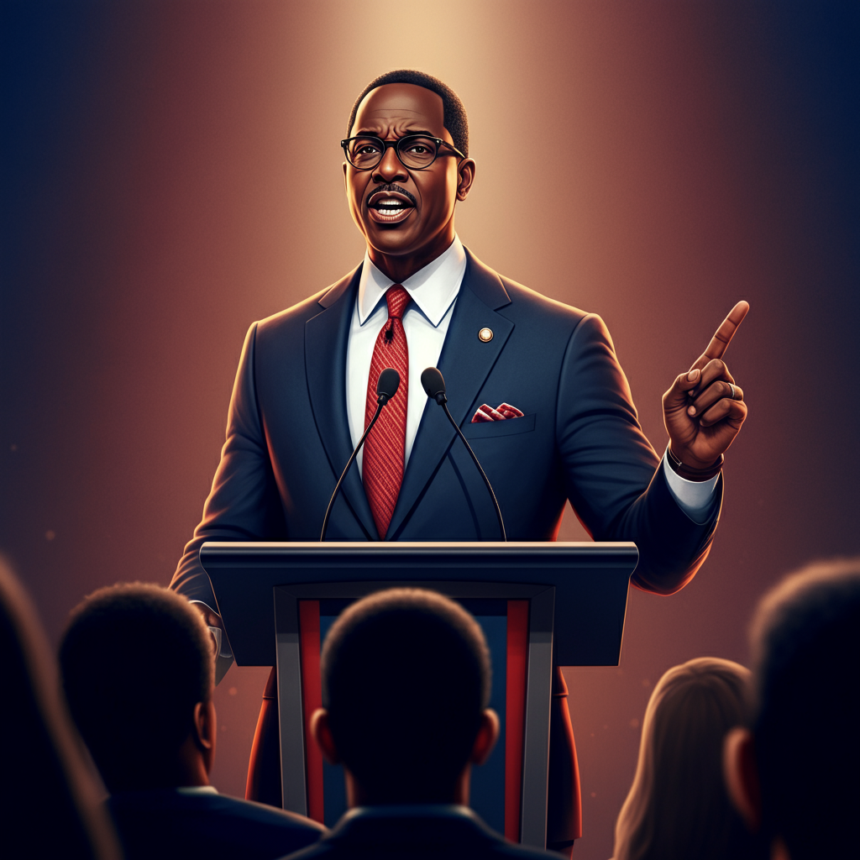Introduction to Larry Elder and His Background
Few personalities in media and politics have had as polarizing an effect as Larry Elder. Known as “The Sage of South Central,” Elder is a conservative radio host, author, political commentator, and lawyer whose career spans decades. A Los Angeles native, Elder grew up in a working-class neighborhood and earned his law degree from the University of Michigan.
Elder has built a reputation as a provocateur, tackling cultural and political topics from a sharply conservative perspective. Over the years, he has transitioned from broadcasting to entering the political ring, running as a candidate in California’s 2021 gubernatorial recall election. But what is it about Larry Elder that makes him such a figure of interest, and why is his influence both celebrated and criticized?
This blog explores Larry Elder’s background, political positions, controversies, and overall impact, offering a clearer understanding of his role in shaping contemporary conservative discourse.
Key Political Positions and Stances
Tackling Government Overreach
One of the central themes of Elder’s ideology is a strong opposition to government overreach. He frequently criticizes high taxes, over-regulated economies, and progressive policies, which he argues stifle economic growth and deter business innovation. During his gubernatorial campaign, Elder vowed to fight against excessive state regulations and reduce bureaucratic inefficiency.
Support for Limited Government
Consistent with traditional conservatism, Elder is an advocate for limited government involvement in people’s lives. He often cites personal responsibility and self-reliance as key contributors to success, pointing to his own upbringing as evidence of what individuals can achieve through hard work and determination.
Social Issues and Cultural Conservatism
On cultural matters, Elder has aligned himself with conservative stances. He has voiced concerns about critical race theory (CRT), claiming it fosters division rather than unity. Additionally, Elder often challenges the narratives surrounding systemic racism and police brutality, arguing instead for a data-driven approach to understanding these complex issues.
Education Reform
Education reform has also been a key focus area. Elder supports school choice initiatives, such as charter schools and voucher programs, believing these policies provide children in underserved communities with better opportunities. He frequently criticizes powerful teachers’ unions, accusing them of prioritizing bureaucratic agendas over the needs of students.
Fiscal Discipline
A vocal critic of California’s high spending, Elder supports strict fiscal policies. He has repeatedly called for a focus on balancing budgets and reducing wasteful state expenditure.
Views on COVID-19 Policies
Larry Elder has been openly critical of the government’s COVID-19 response, particularly regarding lockdowns and vaccine mandates, which he views as infringements on personal freedoms. This position, while resonating with some voters, adds to the divisiveness surrounding his public image.
Analysis of His Impact and Influence
Larry Elder is not just a political figure; he is a culturally significant personality whose ideas resonate with a specific audience. His syndicated radio program, The Larry Elder Show, reaches millions of listeners, and he has authored multiple books that expand on his ideological beliefs.
Elder’s appeal lies in his ability to articulate conservative ideas in a manner that is direct, and often controversial. His rhetoric has inspired many within the Republican Party and conservative circles, particularly among individuals seeking counter-narratives to prevailing left-leaning discourses in mainstream media. For African American conservatives, Elder represents an alternative perspective on race and politics that challenges conventional wisdom.
However, Elder’s influence extends beyond traditional media. His candidacy in California’s recall election against Governor Gavin Newsom brought national attention to his platform and showcased the viability of conservative ideas in traditionally liberal strongholds like California. Though he ultimately lost the election, Elder demonstrated that conservative dissent in left-leaning areas has a notable audience.
Controversies and Criticisms Surrounding Elder
Despite his success, Larry Elder is not without controversy. Many of his views have drawn criticism from political opponents, activists, and even some moderates within the conservative camp.
Comments on Systemic Racism
Perhaps one of the most contentious points in Elder’s career is his position on systemic racism. Elder frequently disputes its prevalence, pointing to data and statistics to argue that issues like police brutality or racial inequality are often exaggerated. Critics argue that his position downplays real struggles faced by marginalized communities.
Handling of Gubernatorial Campaign
Elder’s gubernatorial campaign also drew significant criticism for how it framed issues. Many labeled his positions as too extreme or out of touch with California’s liberal electorate. Accusations of fear-mongering and divisive language further added to the friction between his campaign and opposing parties.
Past Statements and Media Scrutiny
Elder’s extensive body of work is both a strength and a vulnerability. Decades of public interviews, writings, and broadcasts have provided a treasure trove of material for his critics. Past controversial statements continue to be scrutinized, often overshadowing his political achievements and diluting support from undecided voters.
Larry Elder’s Legacy and Future Outlook
Larry Elder remains a significant figure in American conservatism. His ability to maintain a strong connection with his audience while influencing broader conversations on government policy and social issues speaks to his unique role as both a media figure and political candidate.
Moving forward, Elder’s legacy will likely hinge on whether his rhetoric and actions continue to inspire reform or deepen divides. Regardless of public opinion, his work underscores the value of dissenting voices in the political landscape, encouraging voters to engage critically with the policies and narratives shaping their communities.
If Larry Elder’s career shows us anything, it’s that challenging the status quo carries both risks and rewards. His story is a reminder that, whether celebrated or criticized, those who dare to question norms shape the future of discourse.
Frequently Asked Questions
Who is Larry Elder?
Larry Elder is a conservative political commentator, lawyer, and former California gubernatorial candidate.
What are Larry Elder’s core political views?
Elder supports limited government, education reform, fiscal conservatism, and individual responsibility.
What controversies surround Larry Elder?
Elder has faced criticism for his views on systemic racism, COVID-19 policies, and various controversial statements made during his decades-long career.
What impact did Larry Elder have on California’s recall election?
Although Elder did not win the election, his candidacy brought national focus to voter dissatisfaction and highlighted conservative challenges in liberal states.
What is Larry Elder’s lasting legacy?
Elder’s influence lies in his willingness to challenge prevailing narratives, offering an alternative framework for discussing politics, governance, and culture.
Meta data
Meta title
Larry Elder Political Positions and Legacy in Focus
Meta description
Explore Larry Elder’s political stances, controversies, and influence as a conservative pundit and California governor candidate. Learn about his impact and legacy.




